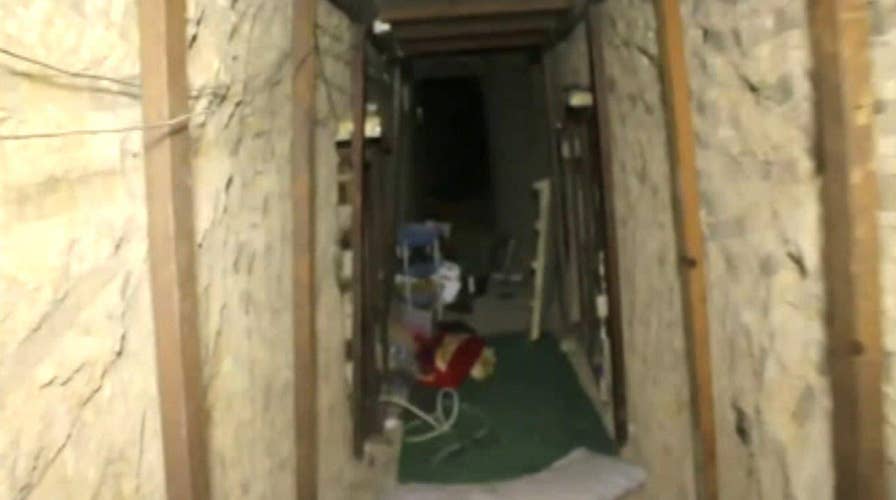NORTHERN IRAQ – As a powerful coalition of forces converges on Mosul in what promises to be a fierce battle to retake ISIS’ Iraqi stronghold, some players inside the black-clad jihadist army are delivering many of the most damaging blows.
Beleaguered and disenfranchised ISIS fighters, cultivated for months by the Kurds, are secretly working with their adversaries, supplying key intelligence on the terror group’s positioning inside Iraq’s second-largest city and its battle strategy for the surrounding region.
EX-ISIS MEMBER SAYS HE WAS TOLD TO SHOOT WOMEN, CHILDREN WHO TRIED TO FLEE
"I will give you more money for information," one senior Kurdish intelligence and security leader recently stated calmly over his cell phone from a safe house in Kirkuk, as the city outside exploded with sniper fire and suicide bombers in a recent attack aimed at diverting coalition forces from Mosul. "But remember that if you lie, if you give me wrong information, we will find you wherever you are and we will get you."
The official was talking to one of his sources within the ranks of ISIS, piecing together information on where ISIS cells may strike next. The furtive conversation witnessed by FoxNews.com was no anomaly, and Kurds, in particular, are making use of agents behind enemy lines.
Many high-ranking soldiers scattered across various units of the Kurdish Peshmerga have nurtured and developed key contacts within ISIS, a strategy begun immediately after ISIS overran Mosul and surrounding villages in the summer of 2014.
MANHUNT FOR SUSPECTS AFTER 4 STABBED AT GERMANY TRAIN STATION
"We have a mixture of some working for ISIS intelligence and others who are in a fighting role," one soldier explained over dinner, glancing out onto the rubble-strewn streets of a liberated Northern Iraq village.
When the discussion moved to the topic of attacks brewing in the nearby ISIS-held city of Tel Afar, he immediately demonstrated his reach.
"I am not sure of all the details for your questions, but want me to call them now to find out?" he said, as he jabbed at the keypad of his cellphone.
A brief, but civil conversation in Iraqi-dialect Arabic followed, and, after hanging up, he spoke at length of the situation inside the critical city, one of several around Mosul where the sympathies of the citizenry are dangerously ambiguous.
Such information is a phone call away, furnished by ISIS fighters who know the punishment for being caught talking to Kurds or Iraqi army members is death. Last week, more than 200 men were reportedly executed inside Mosul for mere suspicion of talking to the enemy.
"They call me, from a secret phone they can only use to call me and vice versa," the Peshmerga soldier said.
Phones and "other equipment" are sometimes smuggled in to informants, who are on their own to provide information, depending on the individual situation.
Turncoats can be cultivated by the promise of money, disillusionment with the brutal tactics of their blood-soaked brethren or in exchange for the promise of safe passage for their family.
What they cannot win, no matter how valuable the intelligence they provide, is asylum from the semi-autonomous Kurdish Regional Government (KRG). The issue is a non-starter.
And the Kurds know the information they receive must be vetted and corroborated, given its inherently dubious provenance.
"Sometimes they lie," cautioned one soldier. "So we have to have many sources. If they tell us something, we must check it and check it with others."
Another high-level counterterrorism military official concurred that the "insiders" are known to give some correct information and some incorrect information at the same time. More than two years into this fight, they have the necessary experience to analyze and determine fact from fiction.
"The way ISIS determines who is a 'spy' isn't by any high-level hunt,” the officials said. “They will often arrest anyone found to have a phone.”
Last week’s mass executions demonstrate the paranoia sweeping through the upper ranks of ISIS as forces, backed by U.S. airpower, close in on their stronghold.
Another top official with the Asayech, the leading Kurdish security and intelligence branch akin to the FBI in the United States, said none of his sources have been caught or killed. He said that ISIS, from the beginning, has been obsessed with the SIM cards inside phones, believing that switching them is a tactic only used by spies. Thus, early on they were banned and subsequently, the barbaric group has gone about slaughtering anyone found with one.
Espionage on the frontier of Mosul works both ways. One Kurdish official said that he is well aware that they likely have a few - not many- moles whispering secrets to ISIS, likely because the terrorist army holds their loved ones under threat of death.
Iraqi National Forces have also spent more than two years tightening their internal terrorist spy network inside Mosul in anticipation of the ongoing offensive. Haitham al-Malaki, head of military intelligence for the Iraqi Army's Emergency Response Division (ERD) told FoxNews.com from his Baghdad base this month that these internal agents have provided information and documents that have helped identify "most of the ISIS communication and financial routes."
Those sources, both from within the ISIS and the civilian ranks of Mosul, are keys for helping coordinate the attack as well as helping the coalition establish safe exit routes for refugees out when forces finally reach the city, he said.

